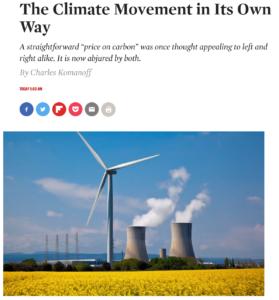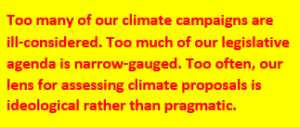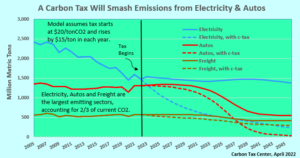The Nation magazine today published my essay, The Climate Movement In Its Own Way. I’ve cross-posted it here to allow comments and offer context.

Use link at top to access the original version of this post in The Nation.
It’s a follow-on to my April 4 essay, also in The Nation, The Case Against Closing Nuclear Power Plants, which I posted here under the title, For Climate’s Sake, Don’t Shut U.S. Nukes.
The new piece calls on progressives in the climate movement — a bulwark of the magazine’s readership — to move beyond ideology and make the climate movement more pragmatic and holistic by supporting carbon pricing.
In introducing my April 4 post, I wrote:
[This post] implicitly embodies a hope that my willingness to examine my own deeply-held convictions in a new light may encourage others to do likewise with their own climate dogma. Reconsideration of ideologically-based objections to carbon pricing by self-proclaimed progressives would be a good place to start.
Consider today’s post an explicit expression of that hope.
— C.K., April 30, 2022
PS: The new post had to be shoehorned into a tight word count. The version below restores a half-dozen phrases cut from the version in The Nation.
The Climate Movement In Its Own Way
After decades of critically documenting nuclear power’s outsize costs, I finally admitted to myself that the carbon benefits from continuing to run US nuke plants are substantial, and in some respects irreplaceable. I made the case for keeping them open in an April article on TheNation.com.
Closing New York’s Indian Point reactors last year was a climate blunder, I wrote. Not just because fracked gas is now filling the breach, but because the need to replace the lost carbon-free power means that new wind and solar farms won’t drive emissions down further. California, facing the same equation, should shelve its plan to shutter the Diablo Canyon nuclear power plant in 2024, I said.
“Total bullshit,” a lifelong anti-nuker wrote me. “You should be ashamed.” More representative of the comments, though, was this: “Continued reliance on nuclear power going forward now is part of the price of our collective past failures.”
 Amen. The failures propping up US carbon emissions are multiple. Not just Senator Joe Manchin, who torpedoed President Biden’s Build Back Better clean-energy legislation. Not just the Senate Republicans, any one of whom could have cast the critical 50th vote. And not just Big Carbon, whose dark money and disinformation perpetuate climate inaction.
Amen. The failures propping up US carbon emissions are multiple. Not just Senator Joe Manchin, who torpedoed President Biden’s Build Back Better clean-energy legislation. Not just the Senate Republicans, any one of whom could have cast the critical 50th vote. And not just Big Carbon, whose dark money and disinformation perpetuate climate inaction.
Through its own poor choices, the climate movement is failing as well.
Too many of our climate campaigns are ill-considered. Too much of our legislative agenda is narrow-gauged. Too often, our lens for assessing climate proposals is ideological rather than pragmatic.
Consider the decade-long campaign to induce pension funds and banks to divest their fossil-fuel holdings. Exxon-Mobil’s share price wobbled for years, but since early 2020 Exxon’s stock has risen faster than the market average. Is Big Oil shamed and starved for new capital today? Not with roaring demand for oil and gas. US motorists’ insanely over-powered, super-sized vehicles account for about a tenth of worldwide petroleum consumption. Yet challenges to American motordom come mostly from outgunned cycling and transit campaigners, not the climate movement.
Now, with most federal action blocked, climate activists sought and won a ban on gas heat in new buildings in New York City, though they failed in their first push for a statewide ban.
The drive to “electrify everything” is laudable, given that electricity can be decarbonized whereas gas furnaces and stoves cannot. Yet trying to take the ban statewide elbowed aside bolder ideas, such as legalizing accessory dwelling units and stopping highway widenings.
To be sure, not everyone is ready to admit that fatter highways and pastoral, exclusive suburbs are carbon disasters. But only broader campaigns can link climate to other pressing concerns like homelessness, housing unaffordability, costly gasoline, and traffic violence.
The granddaddy of US climate failures, of course, is the absence of the one policy that economists believe could unlock the vast emissions reductions needed to meet the Paris Agreement goal of limiting global warming to 1.5 degrees Celsius: national carbon taxation.

A robust federal carbon tax isn’t just the sharpest card in the climate policy deck. It’s like adding a whole new deck to the one we already have.
A straightforward “price on carbon” — administered not via easily gamed cap-and-trade schemes but through “upstream” levies on the carbon content of fuels — was once thought appealing to left and right alike. It is now abjured by both.
The right, of course, is both repellently all-in on fossil fuels and hyper-aware that its wealthy base of profligate carbon consumers would pay the most through a carbon tax. Which makes the left’s antipathy to carbon taxes not just surprising but downright bizarre.
This hesitation has multiple strands: seeing carbon pricing as another contrivance of the predatory capitalism that built white wealth off the land and labor of Indigenous and African-descended peoples; suspicion that carbon pricing lets polluters avoid reducing local emissions by purchasing “offsets”; a misplaced conviction that carbon pricing in California has worsened disproportionate pollution burdens on disadvantaged communities; and excessive faith that a regulatory approach can untangle the multiple strands that enforce fossil-fuel dependence.
Economic models abound to show how fast carbon taxes will shrink the use of fossil fuels. Models aren’t life, but they agree broadly that a robustly rising federal tax could, within a decade, dial back US emissions by about a third.
To turn our backs on carbon reductions on that scale is, I believe, suicidal.
Our worsening climate stalemate led me to abandon my silence as existing nuclear power plants were extinguished. A similar rethink on carbon taxes by progressives won’t win over climate denialists. In time, though, with a more far-sighted left ascendant, it could become a stepping stone to climate progress.
Charles Komanoff, a longtime environmental activist and expert on nuclear power economics, directs the Carbon Tax Center.

Lorna Salzman says
I appreciate CTC’s honest blunt assessment and honesty in acknowledging the dire climate crisis and insisting on its primacy. But when I assess the outrageous overconsumption of fossil fuels, mostly for
non urgent materialist and growth oriented reasons, I feel compelled to remind everyone of the devastation of Chernobyl and Fukushima and the potential for similar future catastrophes. I am not a scientist or in any way technically qualified, but i believe that sufficiently drastic mandatory rationing of fossil fuels, through higher prices and regulation, can and should compensate, even overcompensate, for the energy foregone by shutting existing operating nukes. This is my intuition, not a scientifically proven thesis. The failure to implement the wide range of policies and technologies to rapidly reduce CO2 emissions is deplorable because it gives ammunition to your position to keep nukes running and thus avoid additional CO2 emissions. I understand your position but I sincerely believe that these other options must be implemented rather than continue to expose the world to more nuclear disasters. I strongly oppose anything that gives aid and comfort to the nuclear industry and encourages them to continue their futile efforts to perpetuate a dangerous, expensive way to boil water that will in effect rescue this irresponsible industry and its propagandists to continue to mislead the world about the safety and necessity of a “future energy source whose time has past”.
Drew Keeling says
There is a double-barreled power to this essay. It not only addresses what we should have done, and should still be, because we haven’t yet, but also why we haven’t yet.
The so-called “climate movement” (in many ways more a loose coalition of cheerleaders) has for decades aimed too low and too broadly, obtaining some welcome attention but not transforming it into much accomplishment. Not consistently and energetically popularizing and advocating revenue neutral carbon pricing has been a glaring blot, contributing to what is justifiably described here as “the granddaddy of US climate failures.” (Some other countries have fallen short by less, yet the scale difference between the needed and the attempted, exceeds even the gulf between the attempted and the achieved, and across nearly the whole world). And time is not on the side of carbon neutrality, climate stability or environmental sustainability.
There is more to say, for example, about how inadequate public education, dysfunctional politics, and promise-based policy-making have stymied reform generally, not just with respect to the great climate and energy challenges of our era, now being blown quickly. But this call is a compelling start.
Activist organizations purporting to lead the way to decarbonization, but basically never yet impacting more than a small fraction of global emissions, should be among the first to undertake overdue processes of rectification.
Climate movement, reform thyself !
Howard Shaw says
Unfortunately, too many people see Climate Change as just another problem with the world that should be fixed, but not the most serious problem (by far! Again, “by far!”) that we face. “Sure, we’ll work with you on Climate Change, but only in the context of a wide sweeping revamp of World Civilization (that, while it might be full of good stuff, hasn’t a chance of gathering the necessary widespread support)”. There are a lot of problems that need fixing, but, uh, Priorities??
Mike Aucott says
Your view that keeping existing nuclear plants going is essential is spot on in my view; and I’m heartened that many states now are taking steps to ensure that nukes’ low-carbon power keeps coming. For those who worry about nukes, I suggest reading Nuclear 2.0: Why a Green Future Needs Nuclear Power by Mark Lynas. In this book Lynas discusses why fears of nuclear disasters and radiation are overblown and based on old data. Another good read is A Bright Future by Joshua Goldstein and Staffan Qvist. I’d go further than just keeping the old plants going and fully support R & D into next generation nuclear. We’re going to need every source of low- and zero-carbon power we can get to avoid a climate catastrophe.
I also appreciate your point that “..challenges to American motordom come mostly from outgunned cycling and transit campaigners, not the climate movement.” Many climate activists have too much faith in electric vehicles. Electrifying vehicles is an important step, but it won’t go far in helping mitigate the climate crisis if vehicles’ size and power keeps growing as it has been doing over the last few years.
Here’s a basic calculation that illustrates this problem:
Let’s assume a typical electric car consumes 30 kWh of electricity per 100 miles (that’s the rating for a Nissan Leaf). Let’s also look at the CO2 emissions from power plants’ generation of electricity. This varies a lot around the country, but the U.S. average is about 1200 pounds of CO2 per megawatt hour of electricity produced. If you drive a Leaf 100 miles, consuming 30 kWh of electricity, you’ve emitted, on average, about 1200 lbs CO2/MWh * 1/MWh/1000KWh * 30 KWh/100 miles = 0.37 lbsCO2/mi.
This isn’t much different from the smaller, more efficient gasoline-powered hybrids like the Toyota Prius. They get 50 mpg or more. Burning a gallon of gasoline emits about 19.6 lbs. of CO2. So, one of these vehicles emits 1/50 gal/mile * 19.6 lbsCO2/gal = 0.39 lbsCO2/mi.
As the grid gets cleaner, EVs will do better relative to non-electrics. But if EVs continue to balloon in power and weight and become on average as heavy and powerful as the Porsche Taycan (50 kWh/100 mi or the Ford F-150 Lightning pickup (48 kWh/100 mi) the average grid CO2 emission will have to get down below 800 lbsCO2/MWh for there to be any greenhouse gas benefit at all from switching from an efficient hybrid to a fully electric vehicle.
James Handley says
See economist Howard Gleckman’s post, “Joe Manchin Just Made a Great Argument in Support of a Carbon Tax.” (Sort of.) https://www.taxpolicycenter.org/taxvox/joe-manchin-just-made-great-argument-support-carbon-tax